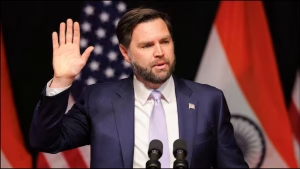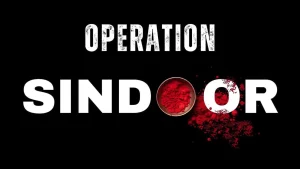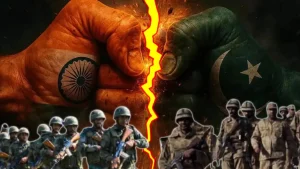New Delhi – In a definitive statement that clarifies the United States’ stance on the escalating tensions between two nuclear-armed neighbors, JD Vance on India Pakistan war has drawn a clear line regarding American involvement. Speaking during an interview on Friday (IST), the Vice President JD Vance unequivocally stated that the US would not intervene in the growing conflict between the two South Asian nations.
“We’re not going to get involved in the middle of the war, that’s fundamentally none of our business and has nothing to do with America’s ability to control it,” Vance declared, establishing a non-interventionist position that aligns with the current administration’s foreign policy approach. This statement on JD Vance on India Pakistan war comes at a critical juncture as hostilities between the neighboring countries have intensified following India’s “Operation Sindoor” – a coordinated missile strike targeting terrorist infrastructure at nine locations in Pakistan and Pakistan-occupied Jammu and Kashmir (PoJK).
The Vice President’s remarks represent one of the most direct statements from a high-ranking US official on the escalating situation, with JD Vance on India Pakistan war emphasizing diplomatic encouragement rather than military involvement.
Also Read: Delhi Security Alert: Bold Safety Measures Implemented Amid Tensions
JD Vance On India Pakistan War Highlights Limits of American Influence

During his interview, JD Vance on India Pakistan war acknowledged the limitations of American influence in the region, stating, “We can’t control these countries, though. Fundamentally, India has its gripes with Pakistan. Pakistan has responded to India.” This realistic assessment underscores the Biden administration’s recognition that even as a superpower, the United States cannot dictate terms to sovereign nations engaged in bilateral disputes.
The Vice President further elaborated on the JD Vance on India Pakistan war position, explaining, “What we can do is try to encourage these folks to de-escalate a little bit.” This approach indicates a preference for diplomatic engagement rather than direct intervention, reflecting a shift away from more interventionist policies of previous administrations.
“America can’t tell the Indians to lay down their arms. We can’t tell the Pakistanis to lay down their arms,” Vance stated, reinforcing the limitations of American influence. The JD Vance on India Pakistan war statement makes it clear that while the US remains concerned about the situation, it recognizes the sovereignty of both nations to address their security concerns.
Diplomatic Channels Remain Primary Focus Despite Non-Intervention Stance
Despite the clear non-interventionist position, JD Vance on India Pakistan war does not suggest complete American disengagement. The Vice President emphasized that the United States would “continue to pursue this thing through diplomatic channels,” indicating ongoing diplomatic efforts behind the scenes.
This nuanced approach in the JD Vance on India Pakistan war statement balances respect for sovereignty with international responsibility, as Vance expressed hope and expectation “that this is not going to spiral into a broader regional war or, God forbid, a nuclear conflict.” The acknowledgment of nuclear concerns reflects the gravity with which the administration views the situation, even as it maintains its position against direct involvement.
The JD Vance on India Pakistan war remarks came just a day after US Secretary of State Marco Rubio conducted separate calls with External Affairs Minister S Jaishankar and Pakistan’s Prime Minister Shehbaz Sharif, highlighting the immediate need for de-escalation. Rubio’s diplomatic engagement demonstrates that while the US may not intervene militarily, it remains actively engaged in promoting dialogue between the two nations.
Operation Sindoor: The Catalyst for Current Tensions
The context surrounding JD Vance on India Pakistan war comments is crucial for understanding the current situation. India’s “Operation Sindoor” was carried out in response to the April 22 Pahalgam terror attack, which claimed 26 lives, including one Nepali citizen, at Baisaran valley. According to Indian officials, the operation targeted terrorist infrastructure rather than civilian or military installations.


Following the Indian strikes on May 7, Pakistan responded with heavy artillery shelling along the Line of Control (LoC), particularly in border areas of Jammu and Kashmir, reportedly resulting in 16 civilian casualties. This exchange has heightened tensions to levels not seen since the 2019 Pulwama attack and subsequent Balakot airstrikes.
India’s Foreign Secretary Vikram Misri, in a press briefing on Thursday, described the missile strikes as a “legitimate and necessary response” exercising India’s right to self-defense. This characterization contrasts with Pakistan’s portrayal of the strikes as unprovoked aggression against sovereign territory.
Historical Context of India-Pakistan Conflicts and American Involvement
JD Vance on India Pakistan war position must be viewed against the historical backdrop of US involvement in South Asian conflicts. Traditionally, American administrations have attempted to mediate during periods of high tension between the two nuclear powers, particularly during the Kargil War in 1999 and following the 2001-2002 India-Pakistan standoff after the Parliament attack.


The current JD Vance on India Pakistan war stance represents a departure from these precedents, suggesting a more restrained approach to regional conflicts where direct American interests are not immediately threatened. This shift aligns with the broader foreign policy vision articulated by President Donald Trump during both his terms, emphasizing American interests over global interventionism.
Security analysts note that JD Vance on India Pakistan war commentary reflects a significant evolution in US foreign policy toward South Asia. Rather than assuming the role of global mediator, the administration appears content to encourage dialogue while respecting the agency of regional powers to resolve their disputes.
Nuclear Concerns Remain Despite Non-Intervention Position
Despite the non-interventionist stance, JD Vance on India Pakistan war remarks acknowledge the nuclear dimension of the conflict. When asked about concerns regarding potential nuclear escalation, Vance admitted, “Sure, we’re worried about these things,” reflecting awareness of the potentially catastrophic consequences of unrestrained escalation between nuclear powers.
The nuclear aspect adds particular gravity to JD Vance on India Pakistan war position. Both India and Pakistan possess substantial nuclear arsenals, and previous conflicts have raised international concerns about the potential for nuclear exchange. The US Strategic Command keeps close tabs on nuclear tensions worldwide, and the South Asian region remains a focus of concern.
This nuclear dimension explains why, despite declaring the conflict “none of our business,” JD Vance on India Pakistan war statement still emphasizes diplomatic channels and de-escalation. The global implications of nuclear conflict ensure that, regardless of direct involvement, the United States maintains a vested interest in preventing worst-case scenarios.
International Reactions to JD Vance on India Pakistan War Statement
The international community has responded with mixed reactions to JD Vance on India Pakistan war comments. Traditional US allies have expressed understanding for the non-interventionist stance, while some international organizations have called for more proactive engagement from global powers to prevent further escalation.
United Nations Secretary-General António Guterres has called for maximum restraint from both sides and urged a return to dialogue. The UN Security Council is expected to convene an emergency session to discuss the deteriorating situation, even as JD Vance on India Pakistan war position signals limited American involvement.
Regional powers including China, Russia, and the European Union have issued statements calling for restraint and de-escalation, with varying degrees of emphasis on the need for international mediation. The JD Vance on India Pakistan war stance has created space for other global players to potentially take more prominent roles in mediation efforts.
Implications for US-India and US-Pakistan Relations
JD Vance on India Pakistan war position presents complex implications for America’s bilateral relationships with both India and Pakistan. For India, the non-interventionist stance might be welcomed as respect for its sovereignty and security concerns, potentially strengthening the strategic partnership that has developed over recent decades.
For Pakistan, the JD Vance on India Pakistan war comments may be viewed more cautiously, particularly Secretary Rubio’s call for Pakistan to “take strict steps to end support for terrorist groups.” This emphasis on terrorism aligns with India’s longstanding position that cross-border terrorism forms the core of bilateral tensions.
The balancing act evident in JD Vance on India Pakistan war statement reflects the delicate position the United States occupies as it maintains significant strategic relationships with both nuclear powers. By emphasizing diplomatic channels while avoiding direct intervention, the administration seeks to preserve these relationships while encouraging peaceful resolution.
Final Word: A New Paradigm in American Foreign Policy
JD Vance on India Pakistan war comments represent a significant marker in evolving US foreign policy. By declaring the conflict “none of our business” while simultaneously expressing concern and encouraging diplomatic solutions, the Vice President has articulated a nuanced position that balances non-intervention with global responsibility.
As tensions continue to simmer between India and Pakistan, the JD Vance on India Pakistan war stance will likely face further tests. Whether this approach proves effective in encouraging de-escalation or creates a vacuum for other powers to fill remains to be seen. What is clear is that the Biden administration has established a distinct foreign policy position that emphasizes sovereignty and diplomatic engagement over direct intervention in regional conflicts, even those with potentially global implications.

